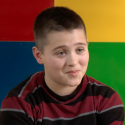
Show the feeling word
Close
Embarrassed
Feeling uncomfortable because you believe others may think something you did or said is weird or silly
Take it further
Emotions matter. Emotions influence our decision making and color our relationships. Research shows that children who develop emotional intelligence skills are kinder, happier, healthier, and more successful. Help your child develop emotional intelligence by playing another round of our feeling words game.
Conversation starters:
-
Ask your child about a time when they were younger when they felt really embarrassed about something. Ask how they feel about it now. Is there anything they could have done then to make themselves feel less embarrassed?
-
Ask your child when they feel most embarrassed nowadays. What can they do to feel better about it? Then tell a story about a time when you were embarrassed as a child, and how you see it now, looking back.
Activities:
Have your child make a series of drawings about embarrassing situations, maybe comic book style with a sequence of frames. Talk to them about these situations and what the best ways of dealing with them are.
Collaborate with your child to make a short video series titled “How Embarrassing!” and share them with others. See whether sharing these stories helps you laugh and feel less embarrassed about those situations.
Book lists:
Explore stories about feeling embarrassed in our feeling word book lists:
Watch more Do you feel me? videos and learn more about emotions.
Read more about the Feeling Words Curriculum.
Have some fun with feeling words with our Mad-Sad-Glad Libs.
Read more about the Feeling Words Curriculum.
Have some fun with feeling words with our Mad-Sad-Glad Libs.

